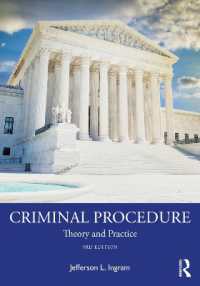- ホーム
- > 洋書
- > 英文書
- > Philosophy
Full Description
'Knowledge-First' constitutes what is widely regarded as one of the most significant innovations in contemporary epistemology in the past 25 years. Knowledge-first epistemology is the idea that knowledge per se should not be analysed in terms of its constituent parts (e.g., justification, belief), but rather that these and other notions should be analysed in terms of the concept of knowledge. This volume features a substantive introduction and 13 original essays from leading and up-and-coming philosophers on the topic of knowledge-first philosophy. The contributors' essays range from foundational issues to applications of this project to other disciplines including the philosophy of mind, the philosophy of perception, ethics and action theory. Knowledge First: Approaches in Epistemology and Mind aims to provide a relatively open-ended forum for creative and original scholarship with the potential to contribute and advance debates connected with this philosophical project.
Contents
1: J. Adam Carter, Emma C. Gordon & Benjamin W. Jarvis: Introduction: 'Knowledge, First: An Introduction'
PART 1: FOUNDATIONAL ISSUES
2: Clayton Littlejohn: How and Why Knowledge is First
3: Mikkel Gerken: Against Knowledge-First Epistemology
4: Aidan McGlynn: Mindreading Knowledge
5: Martin Smith: The Cost of Treating Knowledge as a Mental State
6: Jonathan Jenkins Ichikawa & Carrie Ichikawa Jenkins: On Putting Knowledge "First"
7: Joshua Schechter: No Need for Excuses: Against Knowledge-First Epistemology and the Knowledge Norm of Assertion
PART 2: APPLICATIONS AND NEW DIRECTIONS
8: Timothy Williamson: Acting on Knowledge
9: Heather Logue: Perception First?
10: Jesper Kallestrup & Duncan Pritchard: Epistemic Supervenience, Anti-Individualism and Knowledge-First Epistemology
11: Christoph Kelp: Knowledge-First Virtue Epistemology
12: Anne Meylan: In Support of the Knowledge-First Conception of the Normativity of Justification
13: John Turri: Sustaining Rules: A Model and Application
14: Michael Blome-Tillmann: 'More Likely Than Not' Knowledge First and the Role of Bare Statistical Evidence in Courts of Law








